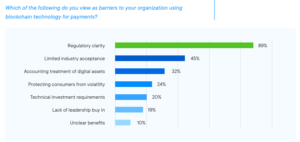According to a recent survey co-hosted by Ripple, the primary obstacle to the adoption of crypto-based payments is the absence of regulatory clarity. Nonetheless, the survey revealed that the global payments industry is optimistic about the potential of blockchain and cryptocurrencies to facilitate quicker and less costly transactions.
On March 2, 2023, Ripple, a digital payment network based on blockchain technology, and the Faster Payments Council (FPC), a payment organization, jointly published a report discussing the possibilities presented by crypto-powered payments.
The report was accurately titled “Transforming the Way Money Moves” offers an overview of worldwide crypto payment trends, which was derived from a survey distributed to over 950 FPC subscribers across 45 countries, including CEOs and analysts. The study involved 281 respondents who responded to 25 queries on the advantages and use cases of blockchain payments, obstacles to digital asset ownership and usage. The survey was conducted in the first half of 2022.
The survey findings indicate that almost all of the FPC subscribers surveyed, i.e., 97% of respondents, held the belief that cryptocurrency and blockchain technology will play a significant role in facilitating quicker payments over the next three years. Additionally, over 50% of payment executives surveyed anticipate that a majority of merchants will start accepting cryptocurrency payments within the next one to three years.
Ripple and FPC suggest that the positive outlook towards crypto adoption in the Middle East and Africa may be attributed to crypto-based solutions such as mobile payments and central bank digital currencies (CBDCs). This assertion is supported by the fact that 27% of executives surveyed from this region believe that most merchants will be open to accepting cryptocurrencies by 2024.
According to the report, while 52% of the survey respondents considered using cryptocurrency for payments, only 17% of them supported the idea of crypto-enabled payments at the time of the survey. The report highlights that the low level of support for cryptocurrency payments could be due to several reasons.
One of the most significant factors hindering crypto payment adoption, according to the report, is the lack of regulatory clarity. Almost 90% of respondents identified regulatory ambiguity as the primary obstacle to using cryptocurrency for payments. Additionally, 45% of interviewees cited limited industry acceptance as a barrier to adopting crypto-enabled payments. These challenges suggest that the industry needs to address regulatory concerns and increase the adoption of cryptocurrencies to encourage wider acceptance of crypto payments.
A survey conducted in 2022 by Pymnts, a financial data platform, and BitPay, a crypto payment firm, revealed that a significant majority of businesses with an annual income of $1 billion were adopting cryptocurrency payments to attract and acquire new customers.

Ripple’s latest report reinforces the significant potential of crypto-related technologies to become an integral part of the global financial system. A survey conducted by Zogby Analytics and CasperLabs in early 2023 indicates that as many as 90% of enterprises in the United States, the United Kingdom, and China have been conducting experiments with blockchain technology. This finding highlights the growing interest in and adoption of blockchain technology across industries and geographies.

Source: Ripple
The announcement coincides with the expectation of Ripple CEO Brad Garlinghouse that the XRP lawsuit with the United States Securities and Exchange Commission will be resolved this year.
Garlinghouse stated that it has been approximately two and a half years since the litigation began, and Ripple has been attempting to progress as swiftly as possible. He added that Ripple anticipates a decision in 2023, with certainty.










